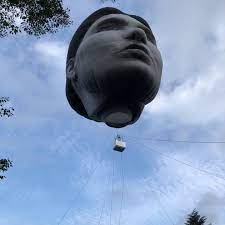I recently worked with a professor who hiked, skied and snowshoed regularly, but still “felt numb from the neck down.”
It is common for smart, busy professionals to feel like they live in their heads, and lose touch with their bodies, and even their emotions. When I was a professor, and before I started a regular yoga practice, I had also experienced this extreme interiority or “living too much in my own head,” replete with monkey mind narratives, incessant to-do lists, and repetitive thoughts about being productive and perfect.
I did run a lot, and even ran marathons, but even then I was living mostly in my own head even though I was running my heart out, and obviously using my body. Running, at times, seemed to even exacerbate my “busy brain” syndrome. I was figuratively (and sometimes literally) on a treadmill, always striving for the next goal.
I also had regular migraine headaches, IBS symptoms, restless nights, and generalized body aches. I was chronically exhausted and increasingly cynical about my job, where I worked at least 50 hours a week under poor leadership. Exhaustion plus cynicism = burnout.
Yoga practice, yoga philosophy and Buddhism brought me back home to myself, and getting certified to coach and teach yoga validated all the ways I wanted to change my life. I also modified how much I needed to produce in a day. I became less demanding of myself, which felt like a relief. Then, head-neck cancer forced me to slow down almost completely, and really take stock of what I wanted my future to be.
All of this “time softening” gave me more time to focus on my mind/body/spirit connections and awareness. And that was a BIG game changer. Because we are always already embodied selves, and as Bessel Van der Kolk warned, “The body keeps the score.” My cancerous body was indeed telling me to slow the heck down, and pay attention to the neck down. You don’t know how burned out you are until it all comes to a screeching halt.
When I finally figured out that my body and my mind are the same thing (the brain is literally stored in the body and connected to other systems), and that my emotions actually produce concrete feelings in the body that impact my thoughts, I seized the opportunity to heal my brain, my body, and my spirit as an internal whole.
In sum, taking time for the integration of things makes a lot of sense for wellness. I found that I was even more productive when I slowed down and stopped all of the frenetic multitasking.
I am now fascinated with my mind/body/emotions and spiritual entanglements, especially as they relate to time and productivity. I find that they are immutably connected in ways that, through coaching, yoga and self-study, have brought me to a more whole, hopeful and peaceful existence.
The brain is an amazing and still-mysterious organ, but if you see yourself as only a cognitive entity, the brain like a balloon floating around with a string or flailing in the wind beneath you, you are missing out on the totality of human experience. Trauma can also cause body dissociation, but I think it can become a habit by being too busy and too perfectionistic as well. Perfectionism, after all, is self-abuse.
And as I always say, how you show up for yourself affects how you show up for others. The “self” is always relational because we humans are radically social and interdependent creatures. That’s how we evolved to survive.
If you are in a high-powered job with lots of cognitive and socio-emotional labor, working with a coach to get back to yourself, your core, your actual body and feelings is powerful and can help you feel more in control simply by figuring out what you cannot control! And you have to consider your feelings about yourself and your interpersonal landscape and give the ego a rest. But it takes time and practice. There is no magic.
You are in there somewhere! And you don’t have to go it alone. I love teaching about and supporting folks in these life-long awarenesses and practices. After a while, you will be able to self-coach, and be on your way.

